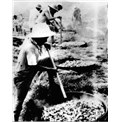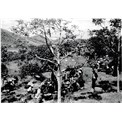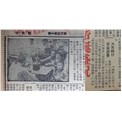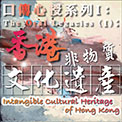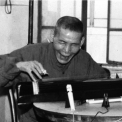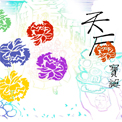-
History & Society
- Education in Pre-war Hong Kong
- History of Taikoo Sugar Refinery
- Hong Kong Products Exhibition
- Local Festivals Around the Year
- Post-war Industries
- Pre-war Industry
- The Hong Kong Jockey Club Archives
- Tin Hau Festival
- Memories We Share: Hong Kong in the 1960s and 1970s
- History in Miniature: The 150th Anniversary of Stamp Issuance in Hong Kong
- A Partnership with the People: KAAA and Post-war Agricultural Hong Kong
- The Oral Legacies (I) - Intangible Cultural Heritage of Hong Kong
- Hong Kong Currency
- Hong Kong, Benevolent City: Tung Wah and the Growth of Chinese Communities
- The Oral Legacies Series II: the Representative List of the Intangible Cultural Heritage of Hong Kong
- Braving the Storm: Hong Kong under Japanese Occupation
- A Century of Fashion: Hong Kong Cheongsam Story
Geography & EnvironmentArt & Culture- Calendar Posters of Kwan Wai-nung
- Festival of Hong Kong
- Ho Sau: Poetic Photography of Daily Life
- Hong Kong Cemetery
- Sketches by Kong Kai-ming
- The Culture of Bamboo Scaffolding
- The Legend of Silk and Wood: A Hong Kong Qin Story
- Journeys of Leung Ping Kwan
- From Soya Bean Milk To Pu'er Tea
- Applauding Hong Kong Pop Legend: Roman Tam
- 他 FASHION 傳奇 EDDIE LAU 她 IMAGE 百變 劉培基
- A Eulogy of Hong Kong Landscape in Painting: The Art of Huang Bore
- Imprint of the Heart: Artistic Journey of Huang Xinbo
- Porcelain and Painting
- A Voice for the Ages, a Master of his Art – A Tribute to Lam Kar Sing
- Memories of Renowned Lyricist: Richard Lam Chun Keung's Manuscripts
- Seal Carving in Lingnan
- Literary Giant - Jin Yong and Louis Cha
Communication & Media- Hong Kong Historical Postcards
- Shaw Brothers’ Movies
- Transcending Space and Time – Early Cinematic Experience of Hong Kong
- Remembrance of the Avant-Garde: Archival Camera Collection
- Down Memory Lane: Movie Theatres of the Olden Days
- 90 Years of Public Service Broadcasting in Hong Kong
- Multifarious Arrays of Weaponry in Hong Kong Cinema
-
History & SocietyGeography & EnvironmentArt & Culture
-
View Oral History RecordsFeatured StoriesAbout Hong Kong Voices
-
Hong Kong MemoryThe Oral Legacies Series II: The Representative List of the Intangible Cultural Heritage of Hong KongRecently Visited
The Tradition and Meaning of Sek Pun
Sek pun, or “basin feast”, refers to the custom among local clans in the New Territories of Hong Kong, in which clansmen sit round to share food in a big bowl or basin (called “pun choi”). “Pun choi” food is a traditional mixed stew dish served in one single wooden basin.
The clans in the New Territories can be divided into two main groups: the Punti (original locality), and the Hakka. Most of the ancestors of the Punti clans had moved to Hong Kong during the Song and Yuan dynasties (960 - 1368), and they spoke mainly the Wai Tau dialect of the walled villages. As the clans thrived and their numbers grew sizably by the mid- to late Ming dynasty (16th to mid-17th centuries), they started organising clan activities such as building ancestral halls, conducting ancestral worship and compiling genealogies. On the other hand, most Hakka clans moved to Hong Kong between the Yongzheng and Qianlong reigns (1723 - 1795) during the Qing dynasty. They spoke mainly the Hakka dialect. The basin feast is a clan activity mainly for the Punti, and its origin dates back over 400 years to as early as the mid- to late Ming dynasty when the clans were taking shape.
It is a traditional culture of the walled villages of the New Territories to enjoy a basin feast on the occasions of Jiao festivals, birthdays of deities, and celebrations such as weddings, the Lantern Lighting Ceremony on the birth of baby boys, consecration ceremonies for the ancestral halls, moving in to a new house, and sek shan tou (eating on the hillside) during the Spring and Autumn Ancestral Worship of Clans. On these occasions, clansmen would have several dozens and even up to a hundred tables of basin feasts ready at ancestral halls or in open spaces in the village, with some even catering to a steady flow of guests who could come and leave at different times.
When they enjoy a basin feast, clansmen sit round to eat out of the same container. This act symbolises unity, enhances their social bond and sense of identity and belonging to the community. Sharing the basin food in wedding occasions and Lantern Lighting Ceremony is imbued with the meaning of identity confirmation, a marriage is formally established symbolising an identity change, and a newborn son is acknowledged as a member of the clan.
Photos
Copyright © 2012 Hong Kong Memory. All rights reserved.






